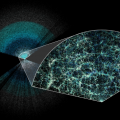
Scents and smells can form the basis of some of the most significant memories humans form in their lives.
A University of Queensland-led international team has boosted understanding of the smell-memory connection, showing that olfactory memory in honeybees regulates receptors in their antennae.
Bees’ antennae function like a human nose, say Queensland Brain Institute scientists Dr Judith Reinhard and Associate Professor Charles Claudianos.
“French novelist Marcel Proust in his novel Remembrance of Things Past (also known as In Search of Lost Time) described how his childhood memories started to flow when he tasted a madeleine cake dipped in linden tea, as he had been given as a child,” Dr Reinhard said.
“Our team found that odour memories trigger recall of associated events, and that long-term odour memory formation in the brain regulates the sense of smell in the ‘nose’ via regulating the receptor molecules.
“Preferences for different foods and beverages are linked to our sense of smell, and our research shows that long-term scent memories modify how odours are perceived.
“In a nutshell: our smell experiences shape our preferences.
“The study demonstrates for the first time that the ability to smell different things is experience-dependent and modulated by scent conditioning.”
Dr Claudianos said the findings could help explain the wide variability of smell perception in humans and the neurological mechanism underlying the common phenomenon of “acquired taste”, where repeated sensory experience with a flavour or aroma leads to perceptual changes.
“This knowledge will provide an enormous insight for understanding food and aroma perception,” he said.
“The discovery may also provide a means to detect early problems with memory formation and memory retrieval in the brain.”
Individuals with neurodevelopmental disorders such as autism and schizophrenia or neurodegenerative disorders such as Alzheimer’s and Parkinson’s disease often have an altered sense of smell perception.
The study Odor memories regulate olfactory receptor expression in the sensory periphery is published in the European Journal of Neuroscience.
Media: Mikaeli Costello, QBI communications, +61 (0)401 580 685, mikaeli.costello@uq.edu.au; Dr Judith Reinhard, +61 7 3346 6321, +61 (0)418 659 191, j.reinhard@uq.edu.au
Queensland Brain Institute
The Queensland Brain Institute (QBI) is a world-class research facility based at The University of Queensland’s St Lucia campus. Researchers at QBI make great contributions to the field by studying fundamental cellular and mechanistic processes, as well as disorders and diseases from early brain development through to later life. Our scientists work to understand complex functions such as cognition, ageing, neurological disease, mental illness, and learning and memory.









